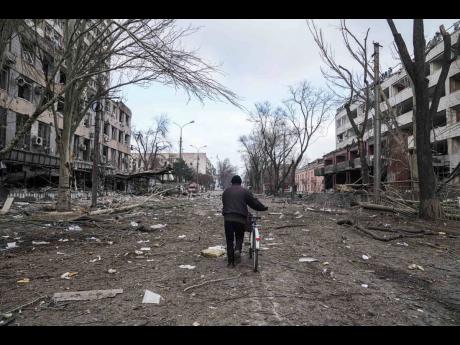Recession watch: Oil, trade experts warn against inaction amid war
The Jamaican government and those around the world, as well as business leaders and consumers, are being urged to begin to consider the possibility and dire implications of a new global recession caused by a conflation of factors emanating from the Russian invasion of Ukraine.
The alarm was distinctly sounded by the speakers at the University of the West Indies vice chancellor’s forum, held at the UWI Regional Headquarters at Mona in Kingston and televised live on Thursday.
London-based oil and gas industry expert Bashir Badawi and Jamaican and Caribbean trade policy practitioner and professor at the Sir Arthur Lewis Institute for Social and Economic Studies, SALISES, Ambassador Richard Bernal, made clear in their analyses of the unfolding consequences of the geopolitical situation in Eastern Europe and its wider global implications, that another global recession akin to the 2008-2009 global economic fallout is a real possible outcome.
Significantly higher oil and grain raw material prices, the knock-on effects of higher inflation, and drastically more expensive transport, food and other prices have been identified as factors that could feed into successive contractions in gross domestic product, constituting a recession.
“We’ve hit US$147 a barrel (for oil) a few days ago. There is talk of US$200 a barrel. I have even heard talk of US$300 a barrel. All of this is going to feed into a global inflationary pressure and we are watching very carefully now, how the world performs over the next two quarters to see if there will be a global recession due to this current crisis,” Badawai said.
He noted that just as the oil industry was starting to level off supply and demand coming out of the COVID-19 pandemic, and aggregate demand was growing, creating positive economic growth in some economies, the world was again starting to see demand destruction. There is also, he pointed out, a scramble to find alternatives to heavy Russian crude, which is needed by oil refineries for mixing with light crude that can be sourced elsewhere.
At the same time, increased public debt, instability in the foreign exchange market, depletion of the country’s international reserves and other fiscal stresses have been identified by Bernal as possible headaches with which Jamaica’s government may have to contend as the Ukraine-Russia conflict continues.
“There was, previous to this, a creeping inflation, but it is certain to increase across the globe. This will be accompanied by increased fiscal stress, because additional expenditures, ranging from humanitarian aid to military and economic support, are already taking place. There is inevitably going to be an increase in public debt across the world, including many developing countries, which are already highly indebted. This will require new multilateral initiatives to reverse and handle this situation,” said Bernal, who is also a senior associate with the Centre for Strategic and International Studies in Washington, and was pro-vice chancellor for global affairs at UWI up to 2020; chief negotiator for the Caricom trade bloc; and once served as Jamaica’s ambassador to the United States.
He is predicting even higher shipping costs and airfares that have hobbled many businesses since the start of the pandemic. This new round of increased travel costs, he believes, could stymie the nascent recovery of tourism, on which Jamaica and other Caribbean countries are heavily dependent.
For Bernal, the unfolding crisis and its vast global economic implications necessitate urgent response actions from the Jamaican and other governments. Such responses, he suggests, should mirror Caribbean countries’ preparations for hurricanes.
“We in the Caribbean are accustomed to the annual threat of hurricanes. When a hurricane comes, the first thing not to do is to panic, and the second thing is not to procrastinate. I want to warn against those people who are dismissing this situation as temporary, short-term, and, above all, something which they can handle. There is going to be need for serious preparation. Anyone counselling complacency is doing all of us a disservice,” he chided.
James Stewart, senior director of economic planning and research at the Planning Institute of Jamaica, identified the deterioration of Jamaica’s international trade balance and capital flight from the country in the wake of a worsening economic climate, as other unwelcome but possible outcomes. He, too, is admonishing the government to accelerate projects already in train to mitigate the economic impacts of the war on the Jamaican economy, such as plans for energy diversification away from the country’s estimated 87 per cent dependence on fossil fuel.
Future contractions in Jamaica’s GDP, he noted, will be largely affected by the cut-off of the Russia market for the country’s export of bauxite and alumina.

